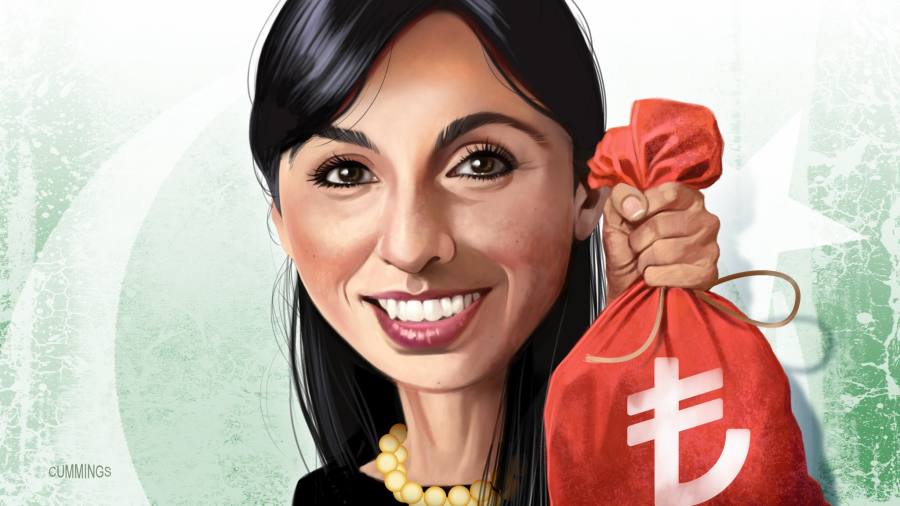For years Recep Tayyip Erdoğan has championed unorthodox economic policies, leaving investors deeply worried about the perilous state of Turkey’s balance sheet. This week, the Turkish president named a new head of the central bank. Hafize Gaye Erkan’s background? A speciality in creating complex models that analyse the risk in the balance sheets of big financial institutions.
“Data is indisputable. Any position can be bolstered by the power of numbers,” the Princeton-educated former Goldman Sachs banker said in a biography published by First Republic, the recently collapsed US lender where she was a top executive until late 2021.
Erkan’s roots in classical mathematical theories contrast strongly with the radical economic views held by Erdoğan, who is on his fifth central bank governor since 2019. The Turkish president has called interest rates the “mother and father of all evil” and insists that high borrowing costs cause rather than cure high inflation.
Şahap Kavcıoğlu, the previous central bank governor, cut rates from 19 per cent to 8.5 per cent in two years, a decision that ignited an acute inflation crisis and placed the lira under heavy pressure.
The central bank has also burnt through about $25bn in foreign currency reserves this year, partly driven by an attempt to stabilise the lira. That will leave Erkan with little room for manoeuvre as she takes on the challenge of turning the bank around.
“I think Erkan’s job is both difficult and easy,” says Hakan Kara, a former chief economist at the central bank. “Difficult, because she has inherited high inflation and an inefficient set of regulations to unwind. Easy, because given the unusually low credibility of her predecessor, she can improve the market sentiment very quickly even by sticking to the basics of central banking.”
Born in Istanbul in April 1979, Erkan’s parents — a physics and maths teacher and an engineer — fostered her quantitative skills from an early age. She learnt C++, a programming language, from neighbours who ran a software group. “In return for me making them Turkish coffee, they taught me C++ and the joy of recursive functions,” she said in the First Republic biography.
After graduating in 2001 as valedictorian at Turkey’s Boğaziçi University with a degree in industrial engineering, Erkan then received a PhD in financial engineering from Princeton University with a thesis on risk management.
The Turkish-American dual citizen then spent nearly a decade at Goldman Sachs, where she advised large financial groups in stress testing their balance sheets. It was there that she met First Republic founder Jim Herbert, who eventually hired her in 2014 to run the Californian lender’s investment portfolio and a key portion of its risk-management function.
Erkan climbed swiftly at First Republic, taking on the additional role of chief deposit officer in 2016. By 2019, she was named one of the “most powerful woman to watch” in the industry by American Banker. In the summer of 2021, Erkan was made First Republic’s co-chief executive and seen as a leading candidate to replace Herbert at what was then one of the biggest US regional lenders.
But her tenure at the top of the firm was short and bumpy: Erkan was involved in a series of interactions with other senior executives described in previous reporting in the Financial Times as “toxic”. She left First Republic at the end of 2021.
The institution has since been at the centre of the biggest US banking crisis since 2008. It faced a huge run by depositors as a result of rate rises that eventually led to its collapse and a fire sale to JP Morgan in early May. This has had some blowback on Erkan, who had played a big role in the bank’s risk management for several years preceding the crisis.
After leaving First Republic, Erkan served a similarly short term as co-chief of New York commercial real estate firm Greystone a year later, being appointed in June 2022 and leaving in December of the same year.
Now, as Turkey’s first female central bank chief, she will get a fresh chance to put her risk-management experience to use when it comes to executing what could be one of the bank’s biggest-ever pivots.
Mehmet Şimşek, who was appointed last week as finance minister, has vowed to restore “rational” policies in the country. Economists and investors say this will require a huge increase in interest rates, at the June 22 central bank meeting if not before.
“The message received and the expectations formed so far point to a strong signal of policy transition, and the June 22 . . . meeting is in a critical position for its implementation,” says Enver Erkan, chief economist at brokerage Dinamik Yatırım Menkul Değerler.
The central bank governor job will surely test Erkan’s diplomatic skills. The Turkish, English and German speaker will need to walk a fine line between setting Turkey on a more sustainable policy path and luring back foreign investors, while appeasing a president who has typically shown little patience with conventional economic policy.
Erkan will need to “rebuild the [central bank] after years of mismanagement, purges, and demotions,” says Wolfango Piccoli at consultancy Teneo. “Like most other key institutions, [the bank] has lost its independence and has been hollowed out by Erdoğan’s drive to centralise power.”
Read the full article here




